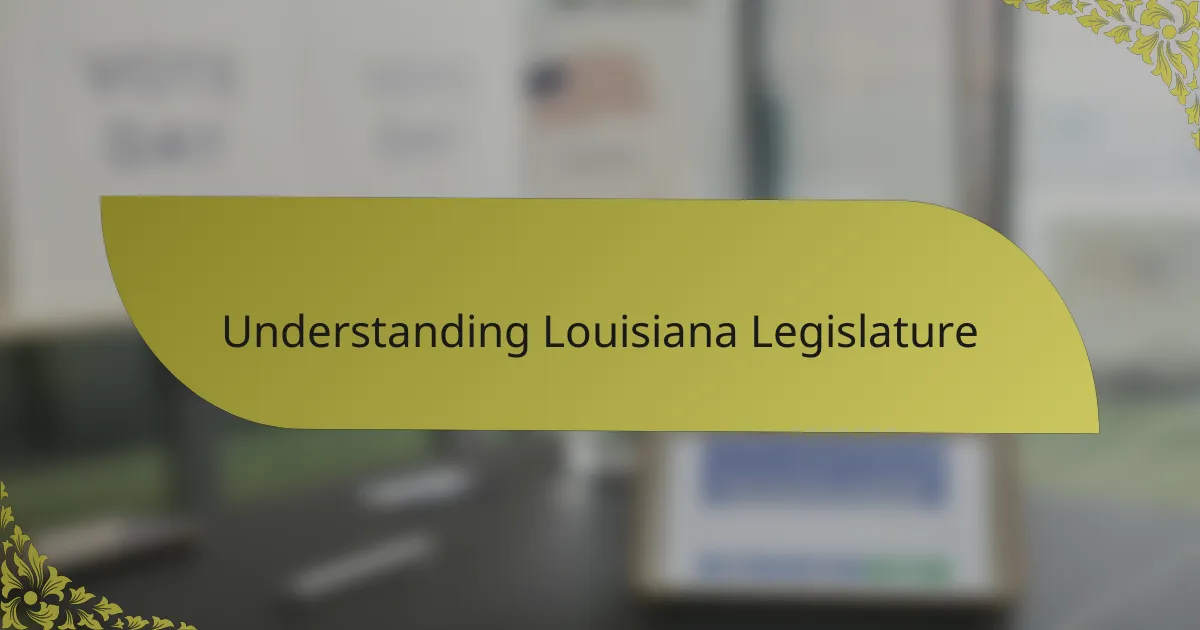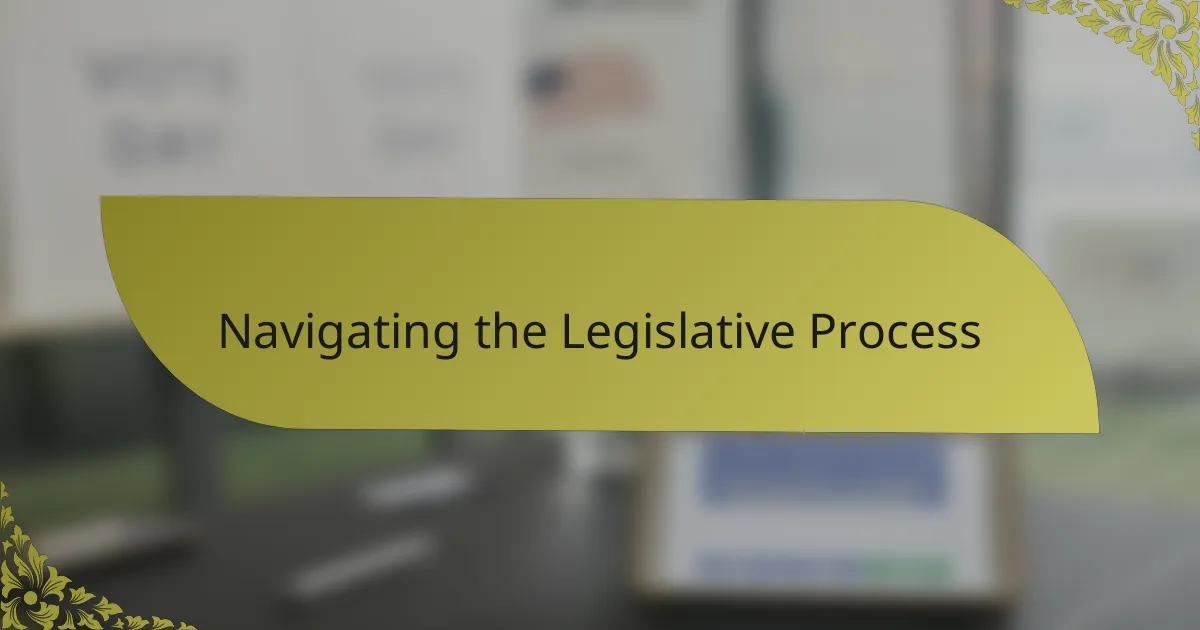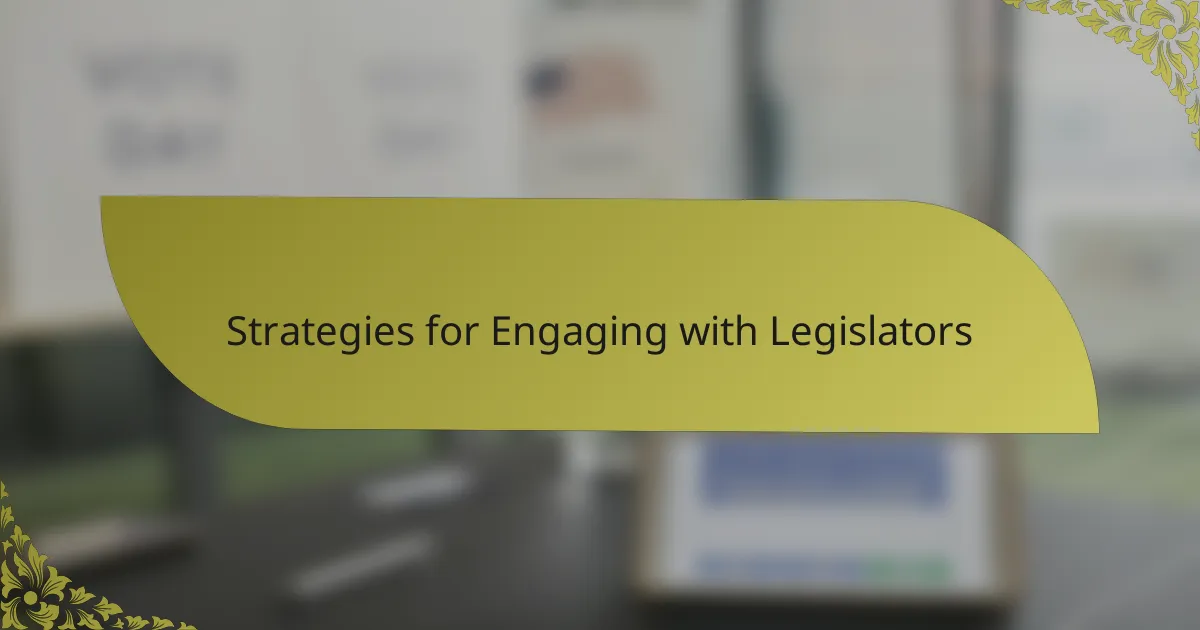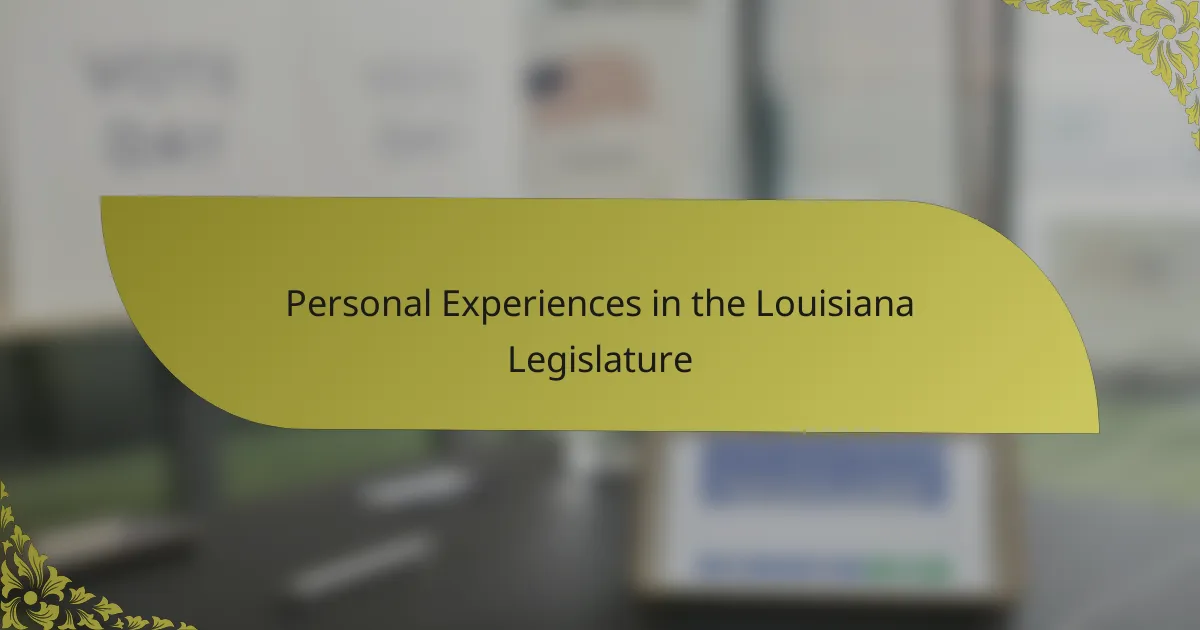Key takeaways
- The Louisiana Legislature consists of a bicameral system with a House of Representatives and a Senate, reflecting a vibrant political environment shaped by community engagement.
- Building relationships with legislators and sharing personal stories can significantly impact advocacy efforts and legislative outcomes.
- Navigating the legislative process requires patience, persistence, and understanding the timeline of bill progression through various stages.
- The interconnectedness of the executive, legislative, and judicial branches emphasizes the importance of each institution in shaping public policy.

Understanding Louisiana Legislature
The Louisiana Legislature is a unique entity, composed of the House of Representatives and the Senate. In my experience attending sessions, I was struck by the vibrant discussions and sometimes heated debates that punctuated the air. How often do you get to witness democracy in action at such a local level?
The legislative process can seem daunting at first glance, but once you understand the flow, it becomes more navigable. Each bill introduced has a life cycle, from committee discussions to floor debates. I remember feeling the thrill as I watched my first bill make it through committee; the support from fellow legislators made the effort feel worthwhile.
Engaging with lawmakers and understanding their motivations is crucial. Often, I’ve found that they genuinely care about the issues at hand. Have you ever interacted with a legislator? Their willingness to listen can be inspiring, reminding me that, despite the complexities, the legislature is ultimately about serving the people of Louisiana.

Overview of Louisiana Politics
Louisiana politics is a unique tapestry, woven with a rich history and a vibrant culture. Having spent time observing its political landscape, I’ve come to appreciate how its deep-rooted traditions influence decision-making. The combination of local governance and state legislature creates a dynamic environment where collaboration and conflict often dance hand in hand.
One aspect that stands out is the importance of community engagement. I remember attending a town hall meeting where constituents passionately voiced their concerns. It made me realize how essential public participation is in shaping policies, especially in a state with such a diverse population.
Here’s a comparison of the key aspects of Louisiana’s political system:
| Feature | Description |
|---|---|
| State Government Type | Republic with a strong executive branch |
| Legislative Structure | Bicameral, composed of the House of Representatives and the Senate |
| Political Parties | Primarily Democratic and Republican, but also features strong independent movements |
| Voter Engagement | High community involvement, often seen in local elections and town hall meetings |

Key Institutions in Louisiana Government
The key institutions in Louisiana government are primarily centered around the executive, legislative, and judicial branches, each playing a distinctive role. I’ve often marveled at how the Governor’s Office sets the tone for the state’s priorities and policies. Have you ever considered how much influence one person can have in shaping an entire state’s future?
The Legislature, as previously discussed, comprises the House of Representatives and the Senate, but it’s also essential to recognize the significant work done in various committees. In my case, I observed that these smaller groups often serve as the heartbeat of legislative action, where ideas take shape and critical discussions happen. It’s fascinating to witness how committee members can champion specific causes and turn them into broader proposals, bridging gaps between diverse opinions.
On the judicial side, Louisiana’s unique legal system—rooted in Napoleonic Code—adds another layer of complexity. From my perspective, understanding the judiciary’s role in interpreting laws made by the legislature is crucial for grasping the state’s political landscape. I once attended a court session that illustrated how the judiciary both reflects and shapes public policy, providing a vital check and balance on the powers of the other branches. It’s moments like those that highlight just how interconnected these institutions are in our daily lives.

Navigating the Legislative Process
Navigating the legislative process in Louisiana can feel like wading through thick swamp mud—challenging but possible. I remember my first time attending a committee meeting; it was both intimidating and inspiring. The energy in the room, filled with passionate advocates and lawmakers, made it clear that every voice matters, and every detail counts.
Understanding the timeline is crucial. Bills go through several stages, including introduction, committee review, and floor debate. Each stage presents unique challenges and opportunities for input. I always found it helpful to connect with legislators early in the process, allowing for meaningful conversations that can help shape the outcome.
The journey requires patience and persistence. Building relationships and alliances can significantly affect a bill’s trajectory. I learned that by attending local town halls and engaging in discussions, I could better understand different perspectives and strengthen my advocacy efforts.
| Stage | Description |
|---|---|
| Introduction | Legislators present their bills to the House or Senate. |
| Committee Review | The bill is scrutinized, and testimonies are taken from experts and the public. |
| Floor Debate | The bill is debated by all legislators before voting. |

Strategies for Engaging with Legislators
Engaging with legislators requires a thoughtful approach. I found that establishing a genuine relationship was essential. Attending town hall meetings and networking events not only provided valuable insights into their priorities but also built trust and rapport.
Another effective strategy was to share personal stories that highlight the impact of legislative decisions. When I described how a proposed law could affect my community, I noticed the legislators were more receptive. Emotionally charged narratives resonate—they remind officials that behind every bill, there are real people.
I also learned the importance of follow-up. After meetings, sending a brief, appreciative message reinforces your interest in their work and keeps the conversation going. This simple act can make a lasting impression.
| Strategy | Description |
|---|---|
| Build Genuine Relationships | Attend events to connect with legislators personally. |
| Share Personal Stories | Use emotional narratives to illustrate the impact of legislation. |
| Consistent Follow-Up | Send appreciation messages to maintain engagement. |

Personal Experiences in the Louisiana Legislature
Navigating the Louisiana Legislature has been a unique journey for me. I recall my first day walking into the State Capitol, feeling both excitement and trepidation. I quickly learned that building relationships is key; it’s not just about the policies, but the people behind them.
One memorable experience was attending a committee meeting where passionate advocates shared their stories. It deeply moved me and reaffirmed why I wanted to engage in the political arena. Each interaction taught me the importance of listening and understanding different perspectives.
| Aspect | My Experience |
|———————–|———————————-|
| First Impressions | Excitement mixed with anxiety. |
| Relationship Building | Essential for success. |
| Emotional Insights | Stories from constituents were impactful. |
| Learning Opportunities | Every meeting taught me something new. |